Knowing how to write a literary essay can be a difficult task. That is especially true if you have never written one before. With the continuous explosion in literary works, there has never been so much information in literature since the history of man. For this reason, knowing how to write a literary essay is a high-value skill to possess. If after reading this article you still need help writing your essay, contact our tutors for help.
What is a Literary Essay?
A literary essay is otherwise called a literary analysis essay. What’s more, it examines and evaluates a literature work to effectively interpret the theme and better understand it or an aspect of the literature work.
Additionally, it involves analyzing a literary work such as a novel, poem, short stories, plays, or any other literary writing to bring out the central idea the author is trying to communicate. It comprises an introduction, body, and conclusion.
The introduction tells your readers what your writing will be about. The body consists of several paragraphs that attempt to convince your readers of your arguments using evidence from the literature. Additionally, the conclusion reaffirms your arguments already drawn out.
In this article, I’ll be breaking down the process of how to write a Literary essay, so you can easily write one.
What is the Purpose of a Literary Analysis Essay?
The purpose of a literary essay is to evaluate a piece of literature work, analyze themes or an aspect of literary work, and to criticize a piece of literature.
Evaluation of a Piece of Literature Work
The first purpose of a literary essay is to evaluate and closely examine the various components of the literary work and how they contribute to its main idea. You scrutinize all the literary parts and find the relationship between them.
Analyze Themes or an Aspect of a Literature Work
A literary essay also helps you analyze the subject, style, form, central theme, the connections between the content and the form, the connection between the main plot and the subplot, the characters’ flaws and strengths, and the storyline in general. You get to study the literary devices, perspective, choice of language, the structure of the text, and even the imagery giving you a more comprehensive and precise picture of the literature.
Criticize a Piece of Literature
Literary essays also help you to criticize the author’s work. After analyzing the entire literary work, you are better positioned to critique the author and his/her style. That, however, is not possible if you have not truly understood the literature in-depth.
What are the Components of a Literary Essay?
The elements of a literary analysis essay and their contribution to writing include:
Topic
Your topic should tell the readers what to expect from the essay. You can use an appropriate quote from the literary work, then put a colon, and then the remaining part of the topic. Make sure it is very engaging so that your readers get drawn in.
Thesis Statement
The thesis statement is the foundation on which you build the other parts of your essay. You lay the arguments and textual evidence onto it so that it makes sense to your readers. Your essay is as good as your thesis, and therefore, it should be thoroughly researched.
Introduction
Your introduction should contain your thesis and summarize all your arguments. It is usually a single paragraph, and like a magnet, it should capture your reader’s attention and draw them in.
Body
The body of the essay is where you present all your arguments and textual evidence. The direction depends on the type of thesis you formulate, whether argumentative, expository, or analytical. It usually comprises three well-developed paragraphs.
Conclusion
The conclusion presents a summary of all your key points. It presents all your arguments in a condensed manner so that your readers will have a final exposure to them.
Steps on How to Write a Literary Essay
The following are steps on how to write a literary essay that will wow your readers.
Step 1 – Read the Text Critically
The first and most essential step to writing an excellent literary essay is reading the text critically. You read it carefully and in between the lines, taking notes as you do so. You also take note of the things that are most surprising, intriguing, and even confusing.
Your number one mission in literary writing analysis is not just to describe the events in the text but to assess and evaluate the writing itself. You are to search for the literary elements that the author used to transmit his ideas and produce desired effects. Also, look out for the connection between multiple works of literature.
Furthermore, focus on different main areas when you begin your analysis. During your analysis, try to find out the relationship between each aspect of the text. Try using notes or highlights to keep track of relevant quotes, passages, and other related details.
Step 2 – Identify Literary Devices
While analyzing the test, you should also be on the lookout for literary devices like:
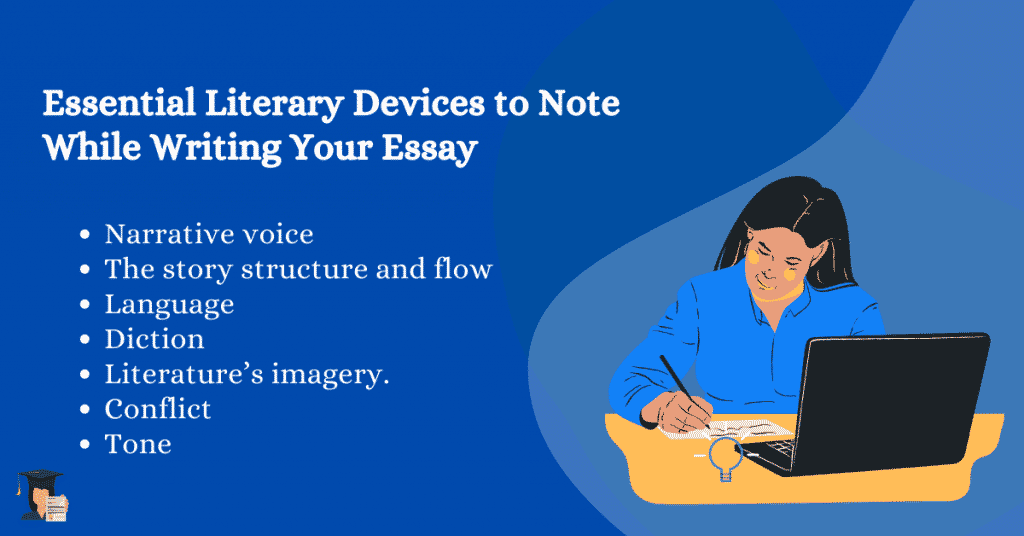
- Narrative voice – It’s also essential to examine the narrative voice. In addition, you should evaluate the perspective of the narrator. Is the narrator’s perspective omniscient, where they know all there is to know about all the events and characters, or is it limited to partial knowledge? Is the narrator unreliable?
- The story structure and flow – Who is the storyteller? How is the story being told? Is the story told in first-person or third-person?
- Language – You should also scrutinize the author’s language choices as well such as the language style. Examine the sentences, whether short and straightforward or poetic and complex.
- Diction -Do certain word choices gauge your interest? What of figurative languages like simile and metaphor? Are they present?
- Literature’s imagery.-Are there recurring images that synthesize a particular notion or stand for something important?
- Conflict – Most literary works possess conflict. You should state which of them resonate with your analysis and how it is integrated through the plot: Person vs. Person, Person vs. Supernatural forces, Fate, or God, Person vs. Nature, Person vs. Self, Person vs. Technology, and Person vs. Society.
- Tone – Another element you should thoroughly assess is the tone of the literature. Is it tragic, comic, or something else? Is the story fantastical or realistic?
Step 3 – Brainstorm a List of Potential Topics
This step will aid you in the formulation of a thesis. You should brainstorm on how the author shows their central idea. Additionally, you should make a list of expressions, facts, and other evidence to use in your arguments.
Ensure that you have enough material to convince the readers of your conclusion. Furthermore, brainstorm on the possible questions.
That said, question yourself on the literature plot and bring out possible answers to the questions. Then try to prove your point and opinions. Some questions to ask and answer include:
- Why did this happen?
- What resonated with you from the text?
- What image, scene, or storyline stuck with you?
- Were there any mixed feelings?
- Why did the author write about this scene or character this way?
- Are there any patterns?
- Are there any contradictions?
Once you answer these questions and others, the author’s mindset will be clearer to you, and you will be able to create mind maps more effectively.
Step 4 – Formulate a Thesis
Formulating a thesis should come after you evaluate all the evidence, not forgetting to brainstorm the best answers to those questions. A thesis is a strong opinion or claim about a literature work, supported by arguments and evidence from the work. This step forms the bulk of your literary writing.
To formulate a thesis, you select an aspect that resonates with you the most. Then formulate the goal of your analysis in a single sentence. That should answer a question. It should be brief and to the point.
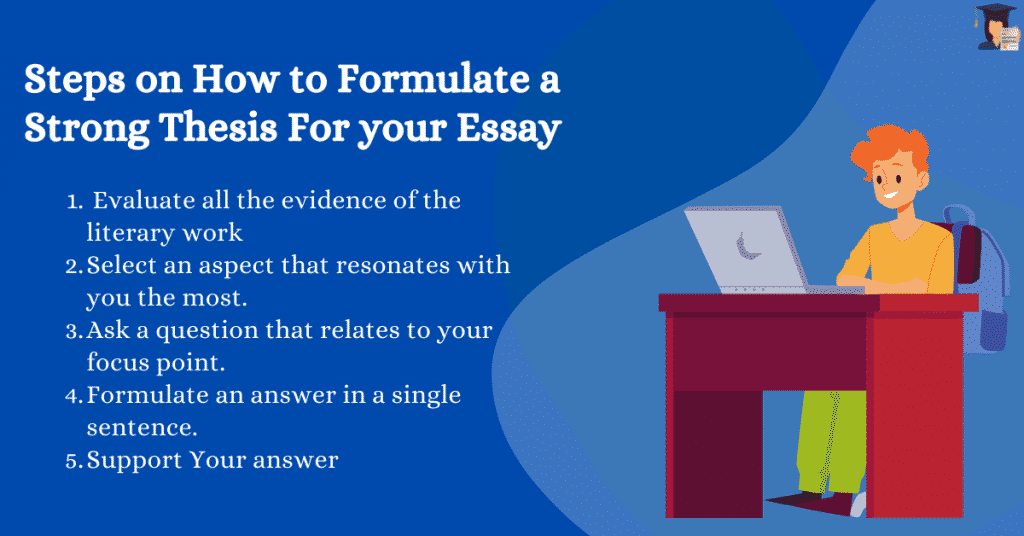
Your thesis should either be analytical, argumentative, or explanatory.
- Analytical Thesis – Usually answers the questions ‘why’ and ‘how.’ It simplifies the idea into small, analyzable parts to better comprehend it.
- Argumentative Thesis – You pick a side on a debatable topic. You make attempts at changing the opinion of people.
- Expository Thesis – You try to illuminate or teach a point.
Step 5 – Draft an Outline
Drafting an outline for your literary analysis is an essential component of your writing process. It would help if you plan what you’ll begin with within the introduction and what you’ll say in the conclusion.
Step 6 – Write the Essay
The next step is to write the essay. The essay consists of the title, the introduction, the body, and the conclusion.
Write the Title
This should indicate the emphasis on analysis. It often contains the author’s name and text(s) you’re analyzing. Ensure that it is engaging and brief.
How to Write the Literary Essay Introduction
The introduction gives a quick summary of your arguments and should include your thesis and an overview of your essay. Structurally, it would help if you start with a broad statement about the author and text. Then you follow this with your thesis.
Additionally, it would be best to end the introduction with an insight into what will be coming up in the essay’s body. You may decide to write the introduction when you’re through with the whole essay because, by then, you are more conversant with the topic as a whole.
Example of a Literary Essay Introduction
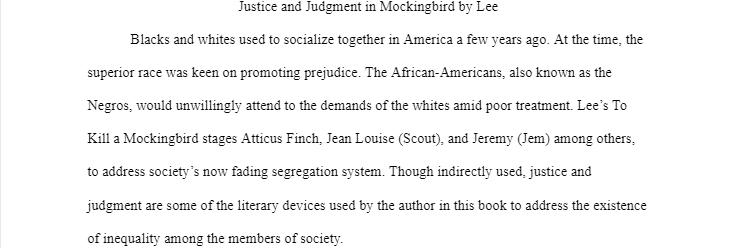
How to Write the Literary Essay Body Paragraphs
The essay’s body consists of everything between the introduction and the conclusion. It contains your arguments and the textual evidence backing them up. Typically, a literary essay has five paragraphs: three for the body and one for the introduction and conclusion.
Furthermore, every paragraph in the main body should focus on a topic. When using the five-paragraph format, you should divide your argument into three primary analytical areas, all connected to your thesis. You should only include arguments that validate your thesis.
Nevertheless, remember to make judicious use of topic sentences at the start of each paragraph. Topic sentences ensure that your essay is focused and give the readers an insight into what each paragraph will be.
That said, it can help to introduce new arguments that serve as a link to previous paragraphs. Also, it would help if you used transition words and phrases like nevertheless, moreover, however, and others. The content of the body of your essay is mainly made up of textual evidence.
Textual evidence gives strength to your claims about the thesis. It gives a firm backing to your arguments using the appropriate evidence from the literary work. You bring out quotes from the literature and discuss their relevance to your point.
However, don’t assume that your quotes are self-explanatory. The introduction should be well-written and the analysis in-depth. You can quote the author’s words directly or paraphrase parts of the text where appropriate.
Example of a Literary Essay Body
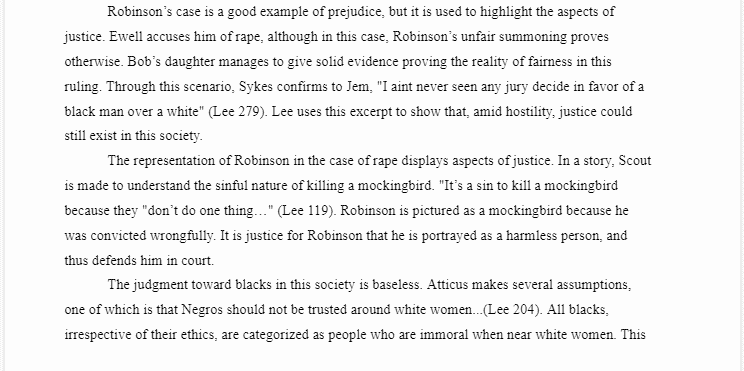
How to Write the Conclusion
Your conclusion should summarize all of your arguments. It would be best not to introduce any new argument within the conclusion. You should bring out a concise version of your arguments and gently guide your readers toward your desired conclusion or the thesis.
The conclusion presents a summary of all your key points. It presents all your arguments in a condensed manner so that your readers will have a final exposure to them.
Example of a Literary Conclusion

The Five Simple Tips in Writing a Literary Essay
The following are tips to follow on how to write a literary essay:
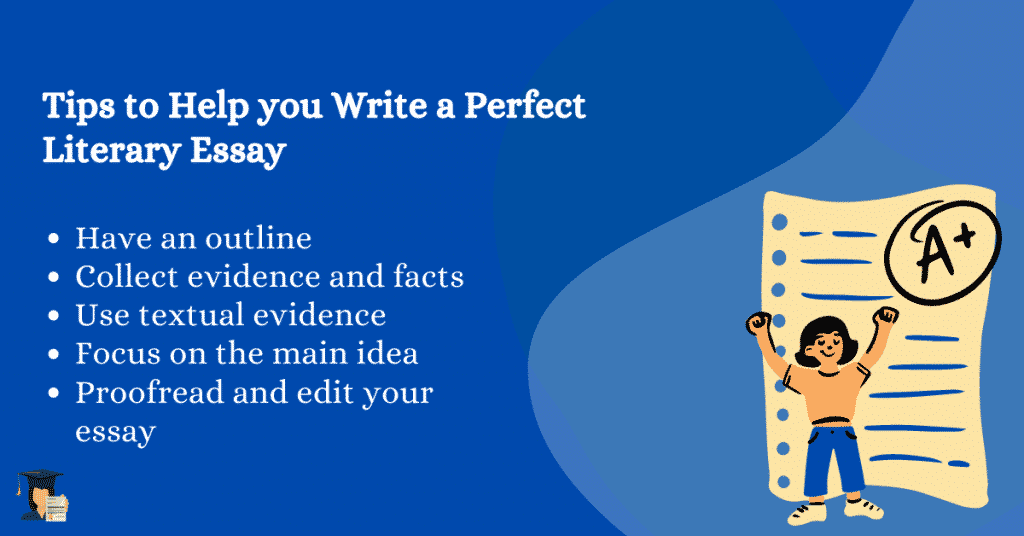
Have an Outline
Having an outline will help you make your writing process less stressful not only by describing the relationship of your ideas to each other and to the thesis but also easy to detect gaps in your content.
Collect Evidence and Facts
Collecting facts and evidence helps you answer the analysis questions. It would be best if you scoured the literature for evidence. Furthermore, take note of symbols, passages, scenes, or images that address your topic. Ultimately, you’ll start forming connections between your thesis and these examples.
Use Textual Evidence
Furthermore, the textual evidence helps support your thesis. It builds an argument to support your claim. It would be best to search the entire literature for appropriate quotations before you begin writing.
You may end up not using all the textual evidence you find, or you may even need to go back to the literature to get more. However, gathering textual evidence from the start will help you plan your arguments better and assess their strengths.
Focus on the Main Idea
Always focus on the main idea of your essay. Also, don’t drift around beating around the bush, leading your readers nowhere. Stick to discussing your thesis by expounding on the arguments.
Proofread and Edit Your Essay
Proofreading is the last writing process before you submit your essay. Remember proofreading and editing is not just to check grammar and spelling, it is also to ensure that your essay ideas are flowing well. You can consider a professional to check your essay to ensure your essay is well polished.
Start Writing!
Knowing how to write a literary essay can be challenging because it requires detailed work. But if you read this article closely and follow the outlined steps, you will write an excellent article and your readers will be engaged from the start.
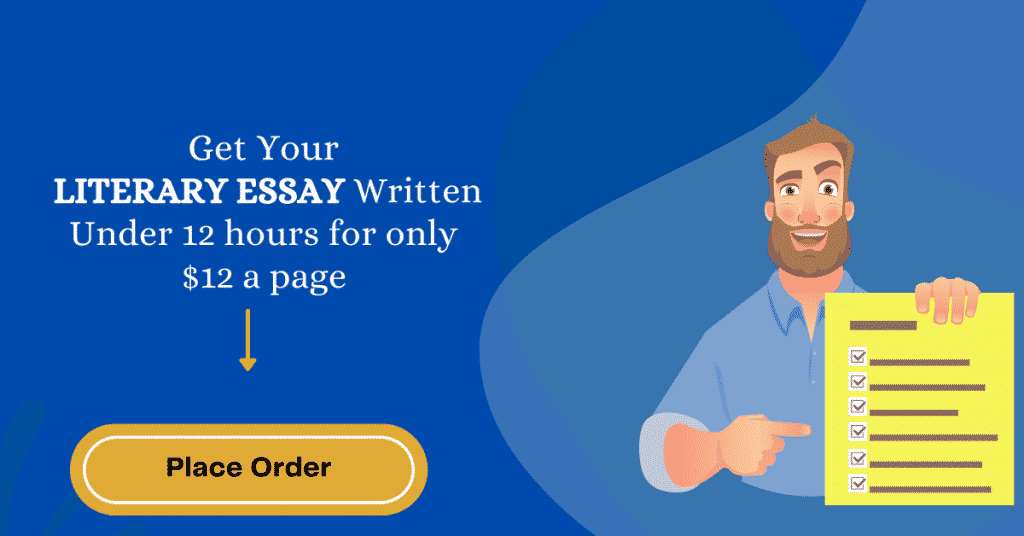
Literary Essay Example
Student Name
Institution
Course
Date
Justice and Judgment in Mockingbird by Lee
Blacks and whites used to socialize together in America a few years ago. At the time, the superior race was keen on promoting prejudice. The African-Americans, also known as the Negros, would unwillingly attend to the demands of the whites amid poor treatment. Lee’s To Kill a Mockingbird stages Atticus Finch, Jean Louise (Scout), and Jeremy (Jem) among others, to address society’s now fading segregation system. Though indirectly used, justice and judgment are some of the literary devices used by the author in this book to address the existence of inequality among the members of society.
Robinson’s case is a good example of prejudice, but it is used to highlight the aspects of justice. Ewell accuses him of rape, although in this case, Robinson’s unfair summoning proves otherwise. Bob’s daughter manages to give solid evidence proving the reality of fairness in this ruling. Through this scenario, Sykes confirms to Jem, “I aint never seen any jury decide in favor of a black man over a white” (Lee 279). Lee uses this excerpt to show that, amid hostility, justice could still exist in this society.
The representation of Robinson in the case of rape displays aspects of justice. In a story, Scout is made to understand the sinful nature of killing a mockingbird. “It’s a sin to kill a mockingbird because they “don’t do one thing…” (Lee 119). Robinson is pictured as a mockingbird because he was convicted wrongfully. It is justice for Robinson that he is portrayed as a harmless person, and thus defends him in court.
The judgment toward blacks in this society is baseless. Atticus makes several assumptions, one of which is that Negros should not be trusted around white women…(Lee 204). All blacks, irrespective of their ethics, are categorized as people who are immoral when near white women. This is a wrong judgment, as the assumption pivots around the color of those being accused, instead of reality.
In conclusion, Lee’s To Kill a Mockingbird is a good example of how justice and judgment dominate a society that hosts two communities that are not cohering responsibly. The aspect of judgment and justice is evident, with regard to how an inferior group faces segregation.
Work Cited
Lee, Harper. To Kill a Mockingbird. 1960. http://giove.isti.cnr.it/demo/eread/libri/angry/mockingbird.pdf




